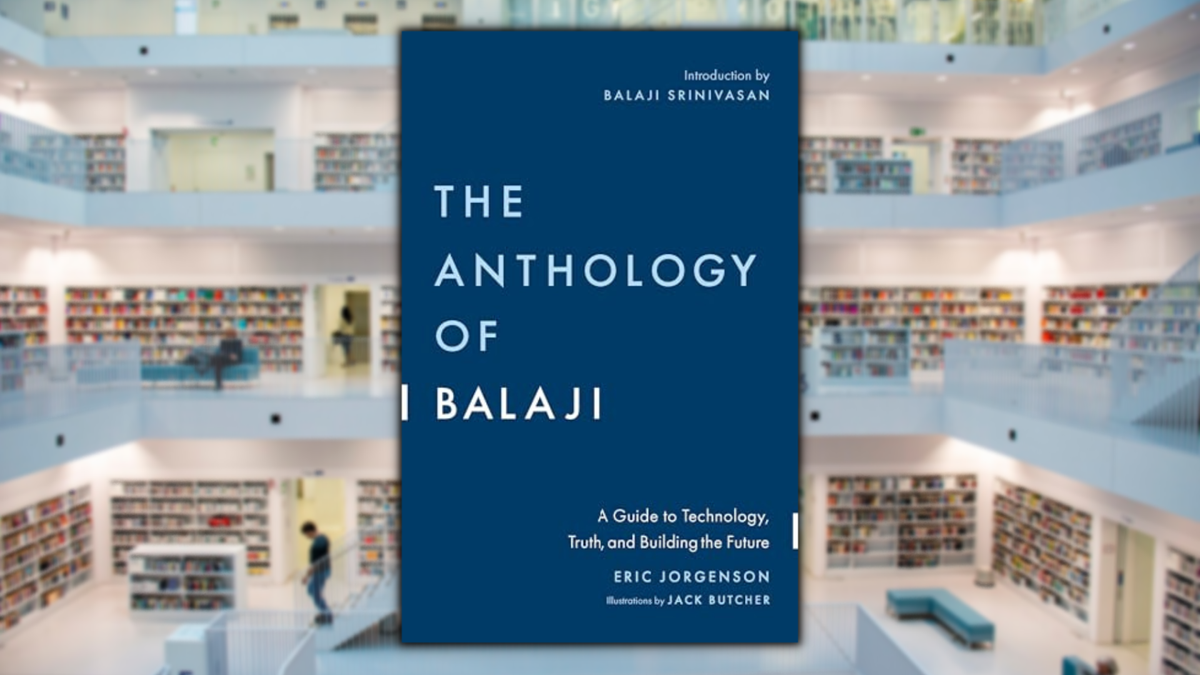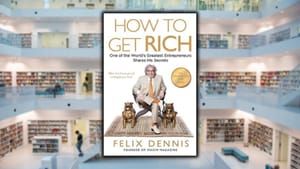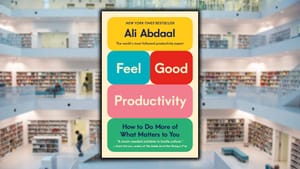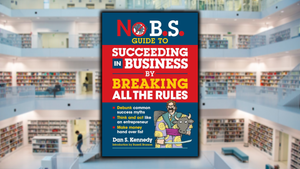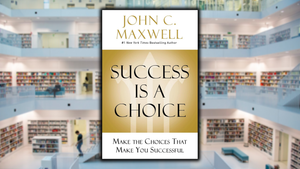
This Book is For:
*Anyone who's fascinated by technology and wants to become more involved, whether that's to study in a certain field, join or start a business, or simply follow along as we invent the future.
*Optimists and other forward-thinking people who are interested in things like life-extension, and other ways that all our lives could be improved by technology.
*People who are concerned about how fast the future is rushing towards us, yet who are open to ways we can mitigate the dangers while remaining open to the exciting possibilities.
*Everyone who believes that the future of humanity is brighter and bolder than its past, and who's ready to build the kind of world they want to live in.
Summary:
“Though it is full of Balaji's ideas, this book is actually a guide to thinking for yourself. Discover your own way to build the future you want to see. You might find your next great investment, start a billion-dollar company, or found an entirely new country.
Does Balaji sometimes sound a bit like a comic book villain? Maybe. He is an eccentric genius, after all. Have a conversation with this book. Adopt the ideas that serve you and wrestle with the others. When you're done reading, put the book down and get to work.
Our future is born anew every day. Use your powers well.
Create a product. Solve a problem. Build."
-Eric Jorgenson
The feel of this book in my hands is like holding a revelation. It's like holding a vision of humanity's marvelously bright future, and after you're finished reading it, that bright, techno-utopian future Balaji predicts and describes is going to seem a lot more believable - and more imminent.
Balaji Srinivasan is a serial entrepreneur, investor, futurist, and yes, like Eric Jorgenson says, sort of an eccentric genius and comic book villain. He's a big, optimistic thinker with his feet firmly on the ground, while his head can be found way up in the clouds. When he looks at humanity and at the world, he sees value and infinite potential; where other people see walls, Balaji sees windows.
All of which makes it kind of difficult to summarize such a wide-ranging book about the potentially million-plus-year future of humanity and all the progress that could occur over that timespan. Make sure you're sitting down while reading this one, is I guess what I'm trying to say.
Eric Jorgenson (who's also the author of The Almanack of Naval Ravikant) said that researching and writing this book made him live differently, and influenced the kinds of companies and fields he invests in. It gave him an appreciation for our place in the history unfolding today and impatience for the many ways we're punching ourselves in the face.
The Anthology of Balaji is built entirely out of transcripts, tweets, and talks Balaji has shared and that are scattered all over the internet, much like The Almanack of Naval Ravikant. In the first part (and the rest of this paragraph is from Amazon), “Technology,” you will see how technology shapes our world today and the ways it could shape our future. In “Truth,” you learn how to think for yourself through the constant clamor of information and media. Finally, in “Building the Future,” you will learn how to wield Technology and Truth to change your life, change your community, and—maybe—change the future of our species.
My breakdown can be read in about an hour, but this, like most of the books for which I've written complete breakdowns, is one that I'd definitely recommend reading in its entirety. There's just too much in there, too many thoughts and ideas that are going to be relevant in different ways to different people, for my breakdown to be an adequate substitute for reading it yourself.
That being said, I've selected 18 of the most fascinating Key Ideas from the book for your consideration here, dealing with everything from life extension and the quest to live forever, to free speech and cryptographic proof of miracles, to the potentially millions of years of technological progress and techno-utopia we have to look forward to, on this planet and out there among the stars.
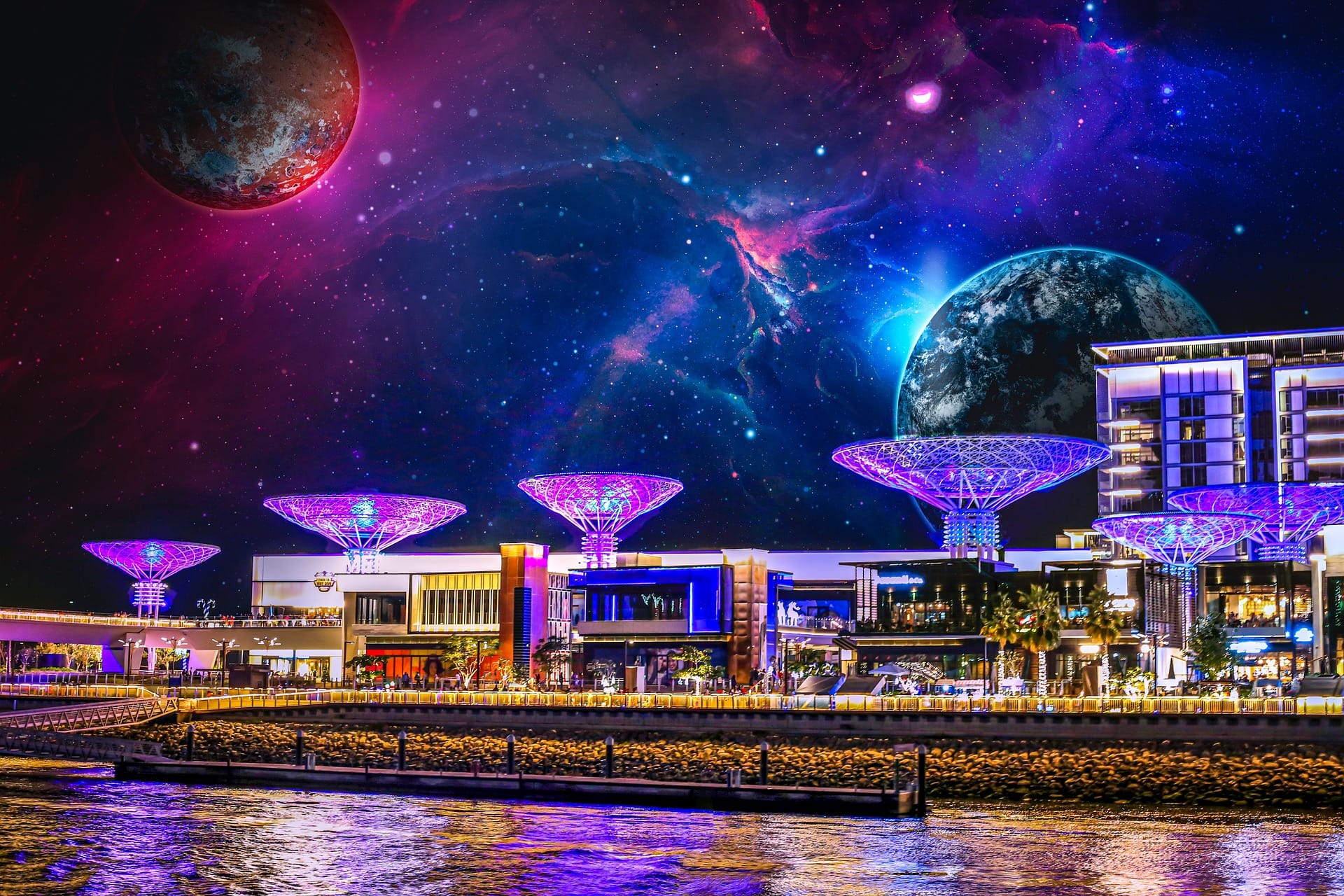
Key Ideas:
#1: Growing Toward Infinity
"I have a long-term horizon; I have my eyes set on the long-term goal of transhumanism. But I'm willing to be pragmatic and execute in the short run. I go down the to-do list toward that North Star. I'm always conscious of the long term.
Every few years, I feel like my life starts anew. I'm in my forties now, but I feel like I've just started because I built up various resources like distribution, network, and capital. Now I can broadcast ideas, invest money, and see big things happen.
The past has all been prologue. Now I've got a canvas to play with. Some people make a bit of money and go sit on the beach. I think of money as a stick of dynamite. It is leverage to go and blow up the obstacles in the path of my next goal.
I'd like to see us ethically and technologically aligned on progress. I'd like to see humanity believing math is good. Believing generating nuclear power is good. Believing getting to Mars is good. Believing expanding is good.
Let's get on the long-term track toward ascent. In my lifetime, I want to see humanity working together to grow toward infinity."
I'm even younger than Balaji (34 at the time of this writing), and I feel exactly the same way - that my life is just beginning. That I'm at the beginning of the beginning of my life, and that my future will be much longer, fuller, and brighter than my past.
This is the dream of transhumanism, which is multifaceted, but rooted in the idea that technological advancements can assist humans in living longer, healthier, more vibrant and cognitively rich lives than has been possible in the entire history of humanity until this point. Perhaps indefinitely, but we'll get to that later.
In fact, some people believe that the first humans who will live to 1,000 years old have already been born...and I don't think that's crazy anymore. Again, more on this later, but when you think of the quite literally unbelievable progress we've made to this point, not to mention the science-fiction-like medical technologies that are either here now or coming soon, I'd say that all of us have plenty of justification for feeling extremely optimistic about not just our own personal futures, but the future of humanity itself.
When you consider what's become available over the last 5-10 years, you have to ask yourself, What if this were to continue indefinitely? Is it that crazy to think that someone who's, say, 5 years old today, would stand a chance of living t0 500 years old given 75 more years of medical progress before they even reach the current life expectancy?
In his book, Excellent Advice for Living, the optimistic technologist Kevin Kelly points out that:
“Over the long term, the future is decided by optimists. To be an optimist, you don't have to ignore the multitude of problems we create; you just have to imagine how much our ability to solve problems improves."
The breadth and scale of the problems we'll be able to solve 75 years from now (5 years from now!) literally only used to exist as science fiction, but today it's an actual possibility. Our capacity to solve problems improves so quickly as a society, yet the majority of people are trained to focus only on shorter timescales.
In their book, Scarcity, Sendhil Mullainathan and Eldar Shafir show that when people are forced to make due with limited resources, their attentional capacities are restricted to a narrower focus on the very next short-term problem. An idea like transhumanism wouldn't even register to the person who has no reliable access to clean drinking water, and why should it? They likely wouldn't be able to spare the cognitive resources to think about living forever. They have to survive today first.
But once we make inroads on solving these sorts of immediate, scarcity problems, we will free up capacity to lift our sights and attack the next biggest problem we face. The world is confronted by far too many short-term problems for transhumanism to become an immediate global priority today, but we can work towards it. Both as individuals and as a society. Individually, we can get rich ourselves and help other people get rich too, which I'll come back to later.
Solve your immediate scarcity problem, and make sure you can survive today and for a reasonable time into the future. Then, as Balaji has done (and is doing), build distribution; build a network; build optionality. Put your ideas out there into the world, claim them, and become known for them. Enlist the help of others to spread those ideas, and build an audience.
Then, on a longer-term horizon, you can think about transhumanism, the techno-utopian future of humanity, and living forever. Never ignore your long-term vision or forget about it either. It has to stay with you, even in the beginning. You have to build the muscle of looking up from your daily concerns and asking the BIG questions, like What am I going to dedicate my life to creating?
Some people think that they "should" or would even want to "retire" as soon as possible and then set up on a beach somewhere, slowly sinking into the sand until they die. But it's a bad idea. Maybe not a bad idea - just a boring idea. Honestly, I'd give it a month or two (max) before you start looking around and asking hard questions again.
Eventually, if you're anything like Balaji and myself (and not everyone has to be, but I suspect many people are), you'll feel an irresistible pull - a compulsion - to start investing in the future you want to live in. To be a part of that future, instead of sitting it out on the beach.
#2: The Emotional Case for Technology
"We haven't made the emotional case for technology. The assumption behind sci-fi like Black Mirror is that the present is okay, but technology could make the future dystopian. But perhaps the present is dystopian and technology is our only hope for a positive future."
Pessimism is a direct threat to the future of humanity. There, I said it.
The creators of these shows and movies, books and other productions - the ones that try to convince you that the world is going to hell and that you should just give up and let it happen - think they're so smart for their "critiques" of contemporary society, but really it's just lazy thinking. Not to mention dumb and harmful.
Assuming that the future will be worse is a self-fulfilling prophecy. Get enough people to believe it, and they'll hasten that dystopia's arrival. They'll either begin acting in a way that's going to make the world worse ("Since the world is running down the drain anyway, I may as well get while the getting's good"), or they'll stop doing the things that could prevent that dystopian future from becoming a present reality ("Starting that eco nonprofit is a waste of time because it's a losing cause anyway"). Lazy, stupid, dangerous thinking. All of it.
Look, it's always up to us what technology is used for, and what's even developed in the first place. We made our present (I'm not going to call it a "dystopia"), and we will make our future too. It's being made right now, with the ideas, beliefs, and behaviors that are growing in strength right now, whatever they happen to be.
#3: The Next Problem is Solvable
“Believing the next problem is solvable is a fundamental tenet of the philosophy of technology.”
All of this is leading up to the fundamental idea expressed in the quote above, namely that a solution exists to our problems and that it's up to all of us, collectively, to find them and put them into action.
Remember what Kevin Kelly said in Excellent Advice for Living: you just have to imagine how much our ability to solve problems improves. That can be hard to see from where we're currently standing. We're at the base, the beginning, of the adjacent possible, and we'll only begin to glimpse our future possibilities once we travel further: the path is made by walking.
To disbelieve in the ability of smart people to devise ingenious solutions is to bet against progress, and that's never worked out for anyone in the history of humanity, now has it? Yes, new technologies create additional problems (cyber-terrorism, nuclear waste, greenhouse gases, etc.), but they also create additional solutions (cyber-security, nuclear safety protocols, solar technology, etc.)
What we need to do is adopt a fundamentally optimistic orientation when it comes to the future. We have to build confidence in our ability to solve big problems, and stack up evidence that we can overcome the obstacles standing before us today.
#4: Technology is Just Getting Started
"The incredible thing many people don't get? Technology is just getting started. We're only at the base of the exponential."
It's exciting enough talking about all the amazing stuff that's here now, but we're only talking about present-day realities and the science-fiction-y stuff that's coming around the very next bend. In, say, 5-10 years. But what about the next 100 years?! What about the next 1,000?!
I mean seriously: what might we be able to do, given 100...1,000...hell, what about 1,000,000 years of technological progress? Think! Dream! Imagine!
There's an absolutely incredible book on this called What We Owe the Future, by the Oxford philosopher William MacAskill. It's one of my absolute favorite books of all time and it's just...mind-blowing. There's no other word for it. Anyway, what he urges us to imagine (there's that word again) is that the 117,000,000,000 humans who have ever lived might represent less than 1% of the total number of human beings who ever will exist.
Here, take a breath while you ponder that.
Seriously, I won't keep going until you're ready.
Still need a minute? You good? Okay...
There could be millions and millions of years of human history yet to come; we could expand and explore and colonize the vast reaches of the outer universe; there are potentially trillions of human beings who will exist (and, most importantly, have great lives) in the future. But only if we solve our most pressing problems now. It's up to us. None of those beautiful, infinitely valuable human beings will ever exist if we don't get our collective shit together, is I guess what I'm saying here.
Another important point that Balaji makes is that the rate of change is accelerating as well. It's not that we'll make the same amount of progress in the next hundred years as we did in the last hundred years, but that we could make more progress in the next 10 years than we have in the last 10 million.
#5: The Most Important Thing We Can Invent
"Mortality is the main source of scarcity. If we had more time (or infinite time), we would be less concerned with whether something was faster. The reason speed has value is because time has value; the reason time has value is because human life spans are finite.
If you make life spans longer, you reduce the effective cost of everything. If reducing scarcity is the purpose of technology, eliminating the main source of scarcity - mortality - is the ultimate purpose of technology. Life extension is the most important thing we can invent.
We need to evangelize technological progress with every word and action. To recognize that the purpose of technology is to transcend our limits and to motivate everything we do with this sense of purpose. To take the winnings from our web apps and put them toward Mars. To feel no hesitation to start small and no shame in dreaming big. To tell the world it is possible to cure the deaf, restore sight, and end death itself."
We are the first generation of humans who actually have a realistic shot at ending death, but...should we?
I think Balaji may be missing something here, but he's absolutely correct in assuming that time has value because it's so limited. Then again, so does life. It means something because it doesn't last forever, and our lives are infused with a thrilling (and terrifying) sense of urgency because they won't last forever.
Ending death might make human lives less meaningful, but I also don't think that's an argument against making the attempt. Because, say we do "end death" and come up with technology that will expand human lifespans indefinitely. You can just...opt in. No one's saying that you have to upload your consciousness to a computer. You can still die if you want. A moral, open question.
Another interesting part to this is that having a realistic shot at living to 500 makes tragic accidents even more tragic, something else that Will MacAskill tackles in his book. If you expect to live for another 480 years, yet die at 20, somehow that's "more sad" than "only" missing out on, say, another 60 years of life.
What every optimistic, forward-thinking person can agree on, though, is that we need to evangelize technological progress and push for the elimination of as much as scarcity as we possibly can. In that sense, life-extension (and everything that comes with it) is the most important thing we can invent. Some people still die even though they don't want to. Some die without even being given the choice.
#6: The Highest Priority of Technology
"A better term might be 'youth extension.' Many people think life extension would just mean more years as a senior citizen. But if we could keep you at twenty-something from a physiological standpoint, or even get you back there, that would be very different."
Balaji believes that "ending death should be the highest priority of technology," and, as stated in the Key Idea above, I don't disagree. At least not completely.
This issue will come up again later in this breakdown, but I'd like to draw the distinction between "value" and "urgency." Ending death could be the highest priority in terms of value (what we should aim for), but not in terms of urgency.
There are many more urgent problems that technology can help us solve - or at least mitigate) before we finally getting around to living forever. No one should starve to death; no one should die from dehydration; no one should be too poor to stay alive. Ending these afflictions is the highest priority of technology.
Balaji makes another important point when he says, "Not life extension, youth extension." Yes! It's not about spending twenty more years in bed at the end of your life, it's about never getting old in the first place. Healthspan, not lifespan.
Again, What We Owe the Future deals with this t00 - in case you can't tell, I really want you to read that book too! It's so unbelievably good. But we're all agreed: we want more years of health and vitality, not more years of sickness and decline.
What's also unbelievably exciting is that all this is beginning to look like just an engineering problem! There's nothing inevitable about aging. It's not like there's some invisible limit beyond which we can't make more progress, some organ we can't grow in laboratories, some brain region within which we can't stimulate neurogenesis. It's all possible. And it's our highest priority.
#7: How to Live Forever
"Think about those 'I took a picture of myself every day for three years' videos. Could a simple video selfie be a diagnostic tool for health tracking?
The key is determining how many health signals you can estimate from a high-definition video of your face taken every day: heart rate, jaundice, BMI, and probably many more.
We can call this device a 'magic mirror.' Look at it in the morning, and it says, 'You look sick,' and tells you why. Correlating the magic mirror video with other self-measurement data (like nutrition and fitness trackers) could give persuasive demos: 'If you do this, you will look like this.'
Essentially, a magic mirror could make personalized 'before/after' examples to visually demonstrate the effects of fitness and diet changes on your health and appearance."
This is more or less an extension of the previous Key Idea, but it was too cool not to draw your attention to it here. I mean, there's nothing stopping us from making diagnostic tools like these a reality. We can make it happen. We can prevent disease, death, and, perhaps worse, aging, and it's not that far off. The future, as they say, is already here!
#8: Win and Help Win
"As a guiding philosophy, 'win and help win' will always outcompete 'live and let live.'"
Legendary speaker and sales trainer Zig Ziglar (whose name is also the most fun name to say in the history of names - try it!) always said that you can get anything you want in life, as long as long you help enough other people get what they want. I first read those words more than a decade ago and they've never left me.
We need each other, and there's literally no one on earth who is "self-made." People say that Arnold Schwarzenegger is self-made, and yet in his foreword to Tim Ferriss's book, Tools of Titans, the very first words he writes are "I am not a self-made man." I remember winning an argument with someone (a discussion, rather) about whether or not Arnold was "self-made," and I distinctly remember the moment I won that argument - when I showed the other person that foreword. Cleanest victory ever!
Anyway, we need each other. Always have, always will. And it goes far beyond just getting out of each other's way; it involves actively clearing away the obstacles in each other's paths so that we can all move ahead faster. That's how the collective game is won.
As we'll discuss in the next Key Idea, wealth creation isn't finite. Someone else's victory doesn't diminish yours, and although alone we can do so little, together we can do so much.
#9: Wealth Creation is an Infinite Game
"Popularity can be measured by likes. Truth can't be. Status is a zero-sum game. Wealth creation isn't."
There are many good games you can play in life: mastering your craft; helping others; making money; raising a family; righting wrongs; and many more besides.
What you'll notice, though, is that the best games are infinite, rather than finite. There can be many winners in an infinite game, multiple ways to win, and the game can be enjoyably played forever and ever. Learning comes to mind - reading books. That's a game where literally everyone can win, and which will never end for as long as you live.
Wealth creation is also one of those games, even though most people aren't conditioned to think of it that way. They think that one person has to lose for another person to win, that someone's wealth comes at the expense of someone else's livelihood, and that there isn't enough to go around. There is.
But there are right ways and wrong ways to play the wealth creation game. Hoarding stolen wealth and harboring a mad desire to accumulate more is one of the fastest ways to lose the game. Helping other people get rich and live better lives is one of the fastest.
We can all win the wealth creation game, and the world can be made richer than we could possibly imagine if we would only work together. Going back to the last Key Idea, that means getting anything we want in life by helping enough other people get anything they want. It's a game as old as time, and there can be as many winners as there are people on this earth.
#10: The Ultimate Independence
“The less money you need, the less dependent you are.”
The brilliant investor (he would agree) Nassim Taleb published an incredible book of 500+ aphorisms that are like lightning bolts to your prefrontal cortex, challenging you to reconsider your received opinions about life, love, money, religion, and everything else that we can't stop thinking about.
It's called The Bed of Procrustes, and here's one of the things Taleb has to say about wealth:
“‘Wealthy’ is meaningless and has no robust absolute measure; use instead the subtractive measure 'unwealth,' that is, the difference, at any point in time, between what you have and what you would like to have."
In other words, the less money you need, the less dependent you are. When you own enough "things" and nothing owns you, you are free.
Taleb goes on to write the following, and I must say that it's jarring to hear him swear! You just don't expect it coming from someone who's read so many books:
“You are free in inverse proportion to the number of people to whom you can't say 'fuck you.' But you are honorable in proportion to the number of people to whom you can say 'fuck you' with impunity but don't."
When you don't have to submit to the will of the people who sign your paycheck; when you don't have to adopt the beliefs and the "accepted speech" of those who seek to control you; when you don't have to depend on anyone to stay alive and move around on this beautiful green earth, you are free forever.
#11: The Cost of Speech
“It’s not just about free speech. It's about the cost of speech. If you're jailed by the state for speech, you may not speak out. But if you're fired by an employer for speech, that is costly too - a cost greater than most can pay. Costly speech means only the wealthy speak freely."
Free speech isn't free, and in some parts of the world, only rich people are allowed to have an opinion. This current state of affairs is due to the mistakes that masses of human beings have made in the past, but as I see it, there are two paths forward.
The first path - and they aren't mutually exclusive whatsoever - is to get busy getting rich yourself. Get as rich as possible so your speech can be as unrestricted as possible and so you can be as free as possible. Get rich enough to be able to speak your mind, yet elevate your kindness to the point where your speech doesn't hurt anyone who doesn't deserve to be hurt.
The second path is to defend the same rights of others, and help other people speak freely, no matter what their past, current, or future socioeconomic status.
This is somewhat of a moral minefield, for reasons of which you're already aware. For some people, "hate speech" is just speech they hate hearing, and the only free speech they support is speech that supports their moral position. I can't go along with them - and I won't, because none of them contribute anything to my income.
Personally, I lean towards all speech being permissible, no matter what, although of course I realize the dangers. Words can and do incite violence, and so you have to ask, shouldn't we ban those types of words and messages? Okay, but who's going to do the banning? Who decides?
Part of the answer lies in parenting and good education. Again, a story as old as time. Better education leads to better outcomes, in virtually every sphere of human endeavor. And great parenting prevents a multitude of problems before they ever become problems in the first place.
#12: Cryptographic Proof of Miracles
"Without cryptographic truth, there is only blind faith. Did Jesus rise from the dead? Well, someone must have hashed that video to the blockchain. Show us the timestamp and proof-of-work chain.
It'll take a while, but eventually immutable timestamped recordings of almost every significant human event will be generated. Then, the highest truth comes not from faith in God or trust in the state, but from the ability to check the math of the network."
It's wild to think that nobody will be able to delete history anymore, but here we are. I mean, how many miracles (Zero? Millions?) have been lost to history because we didn't have the technology to record them?
It's also not hard to think of scenarios where having undeniable, verifiable, cryptographic records will be an enormous help in making the world a fairer, more peaceful place. What's the downside? Surveillance. All the time. Everywhere.
Here's where the "Well, if you have nothing to hide" people overstep, since that's not the point at all. Not sure that even Jesus would want to be under constant surveillance. So here, as elsewhere in the story of technology, what's left for us to do is wait and hope. Or, better yet, find a different way of thinking about the problem or a way around it.
#13: A Purpose-Driven Life
“Learning with intent to use filters down information, and you can snap things into use immediately. That's why I think a purpose-driven life is good. You have a purpose, and you think often about what that purpose is."
We're drowning in information and starved for wisdom (E.O. Wilson). The collected knowledge of humanity (and plenty that I could go the rest of my life without seeing) is available to us 24/7 via the smartphone supercomputers we all carry around in our pockets, but it's the filtering of that firehose of information that most people struggle with.
Filtration is always an intentional process, and you have to know what you're looking for. That's where having a purpose comes in; having values, against which to measure your actions and priorities. Having an overarching purpose to your life gives structure to your learning, and allows you to attach all new incoming information to the architecture of your current knowledge. That's when you're learning for something.
Traditional schooling has no such purpose built into it, and we just kinda expect 18-year-olds to be able to decide - once and for all - what they're going to do for the rest of their lives, or at least until they can pay off all their student debt and pursue purpose in their forties (if ever).
The only reasonable way forward is to break free from the grey, bleak, average mass of the school population and formulate your own purpose. This doesn't have to happen all at once. You're allowed to spend a decade or two looking for it. You're allowed to spend your entire life looking for it. But you have to decide on a purpose for yourself, or else one will be assigned to you.
#14: The Root of All Evil
“Build your wealth, then help others build theirs.”
Misinformed people think that money is the root of all evil. The Bible says that love of money is the root of all evil - but that’s wrong too.
It’s the lack of money that’s the root of all evil. When human beings experience scarcity and deprivation, they resort to violent and hateful means to survive. When people have enough, they're generous and cooperative. Not everyone, sure, but it's enough of a pattern to tell you that when we make the world rich, we’ll make the world good.
And the good news is that there’s plenty of wealth to be created for all of us. I won't rehash the same points in the previous Key Ideas, but suffice it to say that it's well within our capabilities to solve our own scarcity problems and then turn around and help others around the world do so as well. But it's not going to happen by holding on to outdated ideas like money can't be used for good. Money is one of our best hopes for good.
#15: Monetize Your Mind
“Becoming a full-stack creator is also important. Social media is about to become far, far, far more lucrative and monetizable than people realize. They think it's over or stagnant. But we're just getting started. Many who want to build billion-dollar companies will have to also build million-person media followings."
We're living through the digital gold rush right now, and the people without shovels are those who are sitting back, neglecting to build their personal brand online. The best time to start was when YouTube and Facebook first launched, but the second-best time is right now.
What's actually crazy about the whole situation is that there are still billions of people who don't even have access to the internet yet. About 2,900,000,000 people, last time I checked (which was thirty seconds ago). That's almost three billion people who will be following other people, buying products and services, searching for information (and hopefully wisdom), and pushing the creator economy to new heights.
As I write this, the creator economy is set to double in the next few years. Think about that. If you date "the creator economy" from Facebook's inception in 2004, that's twenty years of growth...doubled before 2030. Doubled. If you're not getting in on this, I don't even know what you're doing. That is, unless you have a very good reason for opting out.
There's plenty to be said for a nice, quiet life spent reading books, recharging in nature, and relaxing with friends in family, but what I'm saying - and Balaji is saying as well - is that the massive opportunity is there to create generational wealth, and fast. Major brands are throwing (literally) hundreds of millions of dollars at creators, and mega-creators with massive social media followings are rapidly becoming billionaires.
And. We. Are...Early!
Maybe you don't want to be a billionaire, and that's cool. Actually, fantastically useful exercise is to put a real number to everything you say that you want. It probably costs less than you think. Unless you have zero self-discipline and your hedonic treadmill is on the max setting, you'll find that it's very hard to spend $1,000,000 per year.
The other good news here is that there is a market for literally everything online, and you've got people pulling down eye-popping incomes in the wildest niches. There's a YouTube channel with a million subscribers making videos about knitting, of all things. Yeah. Knitting.
You also don't need to be the best in the world in your chosen field, or be the best looking, or have the most money to spend on paid ads (although those all help). At a basic level, people want to learn from people who know where they're going and how to get there. They want to follow people who tell them the truth, who deal in total transparency and authenticity, and who show up differently than everyone else. That's how you stand out. Different is better than better, and the market is only saturated for average.
#16: Build It Yourself, Build It Together
“Invest in the future you want to see.”
Most people generally want the same things out of life. Speaking for myself, I want to be able spend relaxed, unhurried, stress-free time with my friends and family. I want to read great books and lift heavy weights. I want to do work that I'm proud of, that positively impacts the lives of others, and I want to have a good doing it.
The specifics will vary with the individual, but the broad outlines of a life well-lived are understandable by all. There are a multitude of people who are already living that life, who are actively working to make that kind of life available to others, and you can just join them. You can invest in the future you want to see. Like...that's an option, more than it ever was before.
You (yes, you, the person reading these words) can help direct the future course of humanity and play a meaningful part in shaping the quality of life for every single human being who lives after us. We have the power to do that, now, and it's urgent that we exercise that power, collectively.
#17: The Opening of the Digital Frontier
“The peaceful reopening of the digital frontier could lead us again to a time of greatness. The American and Chinese establishments are trying to close that frontier. That would trap us into the same steel cage match we experienced in the 20th century.
With sufficient technology and wisdom, we can escape these political roadblocks. We can reopen not just a digital frontier, but a physical one: on remote pieces of land, on the sea, and eventually in space.
Today, there are four possibilities for the frontier: the land, the internet, the sea, and space. If we assess where we are right now, we learn that currently 7.7B people are on land, 3.2B on the internet, about 2-3M on the high seas, and fewer than 10 in space.
Creating frontiers is important. Frontiers give pioneers space to innovate without affecting those who don't consent to the experiment."
Humanity needs open spaces to expand into, and shutting down frontiers is one of the fastest and surest ways of plunging the world into conflict.
Luckily for all of us, there are at least four frontiers (the fifth being the mind, but let's table that discussion for now): the land, the internet, the sea, and space, as Balaji points out in the quote above. Which is to say that the universe is wide open for exploration, expansion, and discovery.
We fight because we're all trying to crowd into the same small spaces, and we come together when we have large, inspiring, audacious goals to pursue in a wide open arena like the internet, land, sea, and space. The answer, therefore, is to keep the frontiers open and open them still wider. There's room for all of us once we do.
#18: What Else Comes Next?
"The future I envision is so much better than how we live today. How much better? Think of how much better we are now than starving medieval peasants or slaves building the pyramids.
Future humans will look at today's living standard the way we look at those living conditions. These leaps in progress can continue. We can ascend.
Humans expanded out of Africa to the rest of the world. Oceanic navigation let us cross oceans. When we created submarines, we could go underwater. After inventing airplanes, we could fly.
That's the transhumanism of the past. Those machines all added to human capabilities. Our current constraints will fall away too. We can expand to the stars. We can live underwater. What else comes next?"
It's almost literally impossible to imagine how much better life could become in the future. It's also so easy to forget how rough we had it in the past! And not that long ago, either. The following inventions have saved billions of lives (each):
*Synthetic Fertilizers (Invented in 1909)
*Blood Transfusions (Invented in 1913)
*Vaccines (Invented in 1955)
None of these inventions are more than 115 years old, and the rest of this chart is just insane. There's no other word for it. I counted 39 different inventions that have each saved the lives of at least 1,000,000 people since 1900. Many of them save millions and millions of lives every single year. Insane.
Those new inventions are also coming faster and faster: the rate of invention and improvement is getting faster all the time. Compare the number of lives saved before 1900 and the billions of lives saved after 1900 - what do you notice?
The world still faces massively important, urgent problems. You know that and I know that. But there are also untold millions of people working diligently toward solutions, and the results of their work can be seen every single time you meet someone who would have died without antibiotics, nanotechnology, diagnostic imaging, and everything else that we can't even conceive of yet.
So why do some people seem to think that progress is over? Don't they know what they sound like? They sound like those "esteemed" individuals from the turn of the 20th century who are quoted as saying that everything that can be invented has been invented. In 1900 they said this. Yeah. So how dumb are those people who say the same things now going to look in a hundred years?
So we have problems. Well are you just going to sit there and find fault with everything? Are you going to just sit around waiting to die? Or are you going to get moving? Are you going to join the future and get with the program? Or are you going to sit this one out? I for one believe that the future is going to be so much better that I can hardly sit still.

Book Notes:
“My parents were working all the time, you know. We had sick relatives, so a lot of time and money went to them. My parents were focused on their challenges. I escaped into an inner world of fiction and reading, flying through books. That was my life for many, many years."
“I ended up in detention a lot. Detention was great, because I could read in peace. At the front of the school were rankings of students on the honor roll and in detention. I was always at the top of both."
“I’d never be the world’s greatest athlete, but I was in great physical condition by the end of high school and still have the build from years of squats and power cleans.
This was a useful experience for me because I learned to strengthen things that were previously weak areas. I brought an area up from a zero to a five out of ten just by grinding through it. It was also helpful for me to learn my limitations, to learn humility - unlike an academic topic, no matter how much I practiced lacrosse, I'd never be as good as someone who just had the instincts for it. Knowing what I was weak at allowed me to become strong.
Those are my character traits. 'Good at math,' 'disobedient,' 'grind when I have to,' and 'harshly assess my weaknesses.' This was a disadvantage early on, but it paid off later in life."
“Immutable money, infinite frontier, eternal life.”
"Technology's first law: whatever can be done over the internet will be done over the internet. (Though it might take a while for any given phenomenon to move online.) The statement might sound obvious, but the implications are far-reaching."
“Being too conservative on safety actually leads to systemic risk.”
“Risk aversion is reward aversion.”
“Technology is the driving force of history.”
“Science and technology are not the newspaper headlines of each day; politics and crime are - even if the former is where most of our attention should be."
"To be against technology is to be on the wrong side of history. You can't put the genie back in the bottle. You won't take away voices newly gained by billions."
“There is so much emerging tech to be excited about:
Bitcoin, Ethereum, and crypto in general; startup cities; reversing aging; brain-machine interfaces; transhumanism; robotics; digital nomadism; AI-assisted content creation, including AI video and decentralized video; virtual reality as a replacement for offices; augmented reality for productivity; telemedicine; personal genomics; CRISPR; health tracking; pure biomedicine as well as consumer biomedicine, which overlaps with quantified self. 3D printing in metals is a little more speculative, but I think that's getting better quietly. Pseudonymity aided by crypto and AI voices and faces is also emerging. I think we'll build an entire pseudonymous economy.
I have to remind myself that these things are still new to 99 percent of the population. The way to calibrate this is to ask the average person, 'What are the top five 3D printers?' or "What are the top five drones?'
Most people can't go into the full list. Maybe they can name one or two, but they can't tell you all the innovation that's happening, so it's still early in that space."
"Democrats need to learn experts aren't always right. Republicans need to learn experts aren't always wrong. Libertarians need to learn that a state can succeed. Progressives need to learn that a state can fail."
“Google founder and computer scientist Larry Page said any law more than fifty years old has to be re-examined. Any law written before the internet needs to get re-examined, or it's going to collapse.
Cryptocurrency is going to cause the same situation. Today we have ninety-year-old laws wielded by seventy-year-old people to prevent twenty-somethings from using twenty-first century technology."
"As states lose trust, their soft power declines. Less deference to the state means less voluntary compliance. Then, only hard power is left. The more states use hard power (coercion), the less soft power (persuasion) they have. Which means yet more use of hard power. It's a negative feedback loop."
"Decentralization doesn't mean an absence of leadership. It means a choice of many leaders. Crypto has allowed millions of people to partially exit their existing financial and political systems for large-scale experiments in self-governance and self-determination...even if not all of them have realized this yet. Decentralization restores the consent of the governed."
"Everything technology is doing means more upside, more downside. That's my one-liner for the future: more upside, more downside."
"The blockchain is the most important development in history since the advent of writing itself."
“Crypto is more than an asset class because it transforms the custody, trading, issuance, governance, and programmability of anything scarce. It's a new financial system, not just some ticker symbols."
“Because all value becomes digital, the entire economy will eventually become the cryptoeconomy.”
"The blockchain contains a cryptographically verifiable, replicated, unfalsifiable, and provably complete digital record of a system. It's the ultimate triumph of the technological truth view of history because there are now technical and financial incentives for passing down true facts, regardless of the sociopolitical advantages anyone might have for suppressing them."
“The last era was big data. The next era is verifiable data.”
“Crypto allows free markets without corporations.”
“Bitcoin at $100B is an industry. Bitcoin at $1T is a world power. Bitcoin at $10T would be the global government that so many have predicted, just in very different form. If Bitcoin can truly make it to $10T and stay there, it would constrain all the nations of the world."
“Even when the goods themselves can’t be digitized, the interfaces to them will be.”
“Being really good at software is going to keep earning compounding returns. That's important. I'm increasingly thinking of the physical world as a printout of digital wealth. Ask yourself: what can hitting a button do? In 2010, one button could print a PDF. In 2020, one button can deliver any item. In 2030, maybe one button can build anything."
"Aging may be a reversible condition, if it is caught early."
-David A. Sinclair
"Determining the type of evidence people accept is as important as knowing their incentives. Some take data, but many only accept popularity."
“Many people do not reason forward from logical premises, but backward from social consequences."
“Right now all of the data I'm describing are in separate places. The real estate data happens here, the medical data happens there, the price data happens way over there, the temperature data happens somewhere else. What I call the 'ledger of record' is essentially the integration of all these crypto oracles.
People put data on-chain because they will earn money for supplying it. People pay for the information because they can trade off of it or use it to provide services. Each individual oracle has an incentive to put its data online.
The data of all of those individual oracles go into the ledger of record, which gives us cryptographically verifiable facts about the world."
"Crypto oracles are more important than people think. Today it's global consensus on price history; tomorrow it's global consensus on history."
"Essentially all human behavior has a digital component now. Every purchase, every communication, every Uber ride, every keycard swipe, and every step with a Fitbit - all produce digital artifacts.
In theory, you could eventually download the public blockchain to replay the entire cryptographically verified history of a community. That's the future of public records. This is to our current paper-based system what paper records are to oral records."
"How to change the world:
1. Discover true facts.
2. Acquire sufficient distribution."
"I said I was a pragmatic idealogue, and this is why. I'm an idealogue about discovering true facts and pragmatic about acquiring sufficient distribution.
It's unusual for someone to consciously combine discovering true facts and executing to acquire sufficient distribution, via money or followers. You need to learn how to make media clips and movies, write, publish, direct, encapsulate, build relationships, and build political coalitions; you need to learn how to fight."
"I come into every discussion with the assumption that I need to justify everything from scratch. I take nothing for granted. I'm used to having people quibble with every word and every statement."
"Non-obvious truths are always unpopular in some way, because they are either very technical or very sacrilegious. Popular communication channels are biased toward telling you obvious things or false things - or both.
I worry about how to protect the ability to discover true facts. We need a huge variety of reproducible research. The pseudonymous economy is important because to discover and share true facts, people need protection from backlash or cancellation.
For whatever comes next, we need to have decentralized sources of truth. We need to have statistics that do not come from guys in their basements making things up. This is very important. We need to grow from 'who owns what Bitcoin' today to 'who said what things at what times' in the future.
We will know what facts were asserted, when, and by whom. That is a very powerful thing. With cryptography, we can start to displace media corporations as the source of truth."
"Media is like a shimmery mirror. Reality is on the far side, what you read is on the near side, and the media is controlling the middle."
"They call it the media because it mediates our interpretation of reality."
“Code is how machines know what to do. Media is how humans know what to do. If you ran a computer program over your media diet, you could figure out what concepts you are reinforcing through repetition. The program could show 'nutritional facts' on your media diet, like you see on your food.
A list of the top thousand keywords to pass through your screen would show you what you are loading into your brain. It might not necessarily be the concepts you want to learn."
“If you are what you eat, then you think what you see.”
“Stories that favor their agendas are magnified 100x, while those that conflict are diminished 100x or silenced entirely. The net distortion of reality could be 10,000x or more."
"The story behind the story is usually more interesting than the story. Why this journalist? These sources? This tone? That omission?"
"Perhaps this is the first step in enlightenment: when someone asks, 'Why don't you unconditionally trust media corporations?', you should ask how many articles they have personally independently replicated. Scientists know better than to blindly trust every paper."
"The term 'story' indicates the importance of narrative in modern media. It's so easy to repeat a narrative."
“If you aren’t running a corporation based on hereditary nepotism where the current guy running the show inherited the company from his father's father's father's father, you're more diverse and democratic than the owners of The New York Times Company.
You don't need to take lectures from them, anyone they employ, or anyone under their social influence. You have the moral authority to hire who you need to hire, within the confines of the law."
“The most constructive type of criticism is building an alternative. Yes, deconstruct the establishment. Use every verbal, technical, and monetary weapon we have. That is extremely important. But build something better. It is incumbent on us to build something better."
"We need a different form of media all about relevance and skill building, an optimal information diet. What skills do you actually want to build?"
"The media you consume changes the decisions you make. The technology you have changes the decisions you can make."
“On the other end of the spectrum is reading about some issue in a different country. Unless I have relatives, businesses, or operations there, it's not relevant to me on a daily basis.
People might say, 'You should be concerned about these things.' The problem is there are seven billion people on the planet. As a kind of toy experiment, think about this.
There are 86,400 seconds in a day. In 12 days, if you learn one of those seven billion people's names per second, you could learn the names of a million people. It would take you 120 days for 10 million people; 1,200 days for a hundred million people; and 12,000 days for a billion people.
Basically, it would take your whole life to even learn the names of the seven billion people on the planet. You cannot possibly care about them all equally. You have to triage or somehow prioritize. You have to rank-order what you're paying attention to."
"Algorithms and incentives could surface what is important and true rather than what is popular and profitable."
"On the other hand, optimizing for sentiment around a keyword like 'Mars' or 'Bitcoin' is something new. It's essentially pure activism.
An organization optimizing for creating sentiment around Mars or life extension would get very different results.
Sentiment was hard to measure until recently, thanks to Natural Language Processing (NLP), a computer's ability to understand human language.
Prioritizing changing sentiment instead of clicks means creators stay ethical and avoid the trap of creating clickbait. We can all found, fund, and patronize personal media corps committed to key ideas, such as faster drug testing, self-driving cars to cut traffic fatalities, or nuclear fusion to stop climate change.
Any thesis for positive change through technology can be turned into a media company. We can fund creators to produce amazing content on life extension, brain-machine interfaces, or colonizing Mars.
Clicks and prestige would be zero-sum metrics for a decentralized activist community, but sentiment is not. You're convincing the external world something is a good idea.
Fill up the sentiment bar, and we can go to Mars."
"As the Fourth Estate, the press sees its role as holding others in society accountable. As the Fifth Estate, social media is how society holds the press accountable. You can't have an 'informed citizenry' if citizens can't inform other citizens. The concept of social media as the Fifth Estate may be the most enduring part of Mark Zuckerberg's contribution."
“Own a media corporation or be owned by one.”
"Only the very richest people can afford to be cynical about the merits of technological progress. The billions of people who just got their first smartphones had their lives dramatically improved. They are too pragmatic to romanticize the past."
"People with scientific and technical backgrounds have not taken it upon themselves to write about technological progress as a duty. We need to take time out of our busy days to make the case, repeatedly and with high production values, that technological progress is the most important thing we can do for broad prosperity, economic growth, and for life itself.
We may not get life extension or the whole suite of transhumanist technologies (brain-machine interfaces, stem cells, CRISPR gene therapy, and more) unless you, personally, evangelize them online.
Not just with tweets, but with articles. Not just with articles, but with videos. Not just with videos, but with feature films. Not with just a few films, but with an entire Netflix original library's worth.
We need to create a parallel media ecosystem full of inspirational content for technological progressives - a lifetime's worth of content that makes the case for immutable money, infinite frontier, and eternal life."
“To get lucky, you must first take a chance.”
"You want a win-win mentality rather than a crabs-in-the-bucket mentality. A win-and-help-win mentality is even better. Your win helps you help me win, and vice versa. Win and help win is actually the profit maximization strategy in the long term.
When crabs-in-a-bucket don't have enough resources, nobody ends up with resources because everybody is getting pinched. Win and help win is actually how technology and venture capital works."
"We have bad metrics as a society. Rather than GDP, GDP-per-capita, or the stock market, perhaps we should have dashboards of life expectancy (health) and net worth (wealth). A good leader is one who improves these metrics for individuals and society as a whole.
Here is my reasoning: most people can't tell you how to compute GDP, but they can tell you what net worth and life expectancy are. They know what it means for those numbers to go up, and they know making them go up is valuable. If these numbers have gone up for you, your life has improved."
"Good: Helping others without concern for yourself.
Smart: Helping others while helping yourself.
Evil: Harming others while helping yourself.
Stupid: Harming others while harming yourself."
“On the internet, we see more upsides and more downsides in everything. Technologists focus on the upside, because the gains should compound, while the losses should be individual events. Once you find a winning formula, you can scale it quickly to make it cheap. This leads to even more net upsides over time, just like every past technological revolution has."
“After my first big liquidity event, I had around ten years of personal runway (the number of years one can go without working). That's when I became kind of invincible, in a sense. Saving money and separating from organizations made me intellectually independent. It was like giving myself tenure."
“I don’t buy cars or homes. After I earned a big payout, whenever I could save time with money, I did. That's the single biggest change I have made. I spend my money on being able to work harder. It sounds funny, but it's true.
I'm not a consumption person; I'm a production person. I'm not burning capital on stuff. Everything is going into the next compounding outcome - not just compounding money, though money is an important tool. Knowledge compounds on other knowledge. Impact, same thing."
“Reducing your cost of living to 1/5x is way easier than increasing your net worth by 5x. If you're willing, you can move to the middle of nowhere and cut your expenditures. You can just read Kindle and live on simple, healthy foods. You can basically reduce your consumption to the level of a grad student.
Then you can go from making, say, 120k in San Francisco and spending 100k a year and having no savings to making 120k in Bali, Indonesia, but only spending 30k or 40k a year with a better quality of life.
Now you're banking 70k 0r 80k a year, and your expenditures are only 40k a year. So every single year you work, you're building up one or two years of time off. That's time off you can use to start a company. It's like angel investing in yourself."
“The ultimate morning routine is to be able to wake up whenever you want.”
“Technology is how civilizations unlock new frontiers. Columbus used new navigation techniques to find the new world because the Ottomans had blockaded the known route to India. The internet has actually been the frontier for the past few decades, and with crypto, that will likely continue."
“Don’t argue on Twitter. Build the future.”
"We are entering a golden age for builders. Consider open source, 3D printing, app stores, and crowdfunding. One person can de-risk, prototype, and accept payments from around the globe.
To influence the direction of tech, pick up a keyboard or put capital at risk. You can build something. Those who won't build will just preach.
That keyboard is increasingly available to billions of people around the world. They have no illusions about the relative utility of preaching versus building."
"The really cynical person and the really docile person have one thing in common: they never make bold moves."
“Don’t do a startup unless you're ideologically driven to make it succeed. You need something beyond economic motivation, because startups are very hard. There are much lower-risk ways to earn money than a startup. Building a startup is an extremely stressful journey toward infinity."
“History is the closest thing we have to a physics of humanity. It provides many accounts of how human actors collide and interact with each other.
The right course of historical study encodes, in compressed form, the results of innumerable social experiments. You can learn from human experience rather than re-deriving societal law from scratch. Learn some history so as not to repeat it."
“The gap between stated preference (what is praised) and expressed preference (what is bought) is an inexhaustible source of startup ideas."
“From a founding and investing standpoint, you have to consider strategic questions. What kinds of platforms are there? What new platforms cure such a pain point that people get on it? Then what else can be deployed on that platform? One of those new platforms is going to be crypto. Lots of people getting crypto wallets is good. We can deploy all kinds of new software once most people have wallets."
"The best entrepreneurs are logical enough to think of unpopular truths and then social enough to make those truths popular."
“Think big, start small. Prove, then scale.”
“Anything founded before the internet may not be able to survive the internet.”
“You can’t survey your way to an innovation.”
“Many will strike out at you casually. Later, they will recant, also casually! That's the bit to remember: most hatred is a mile wide and an inch deep. Strip away the negative adjectives and distill legitimate criticism into bugs to fix. Then just plow on."
“With most businesses, the main problem is indifference - people don't even care. If you polarize people and 20 percent (or less) who hear about you love you, you can make a business from that."
“Equity unites, politics divides.”
“Your job: ensure each person wins more when all others win. Off-diagonal incentives will kill organizations. Politics arises when one person's biggest win involves (or requires!) another person's loss."
"More people, more differing incentive structures (hence problems)."
"Both the best and worse CEOs have this in common: the company could run without them."
“When you’re beginning to scale your business (when users or revenue growth are consistently growing), here's a piece of advice: include a paired metric of quality to compensate for possible cheating of the main growth metric.
If you incentivize salespeople on the basis of revenue, you also should look at customer feedback, churn rate, and per-customer profit. Ideally, you assess profit rather than revenue. If you focus on growing users, pay close attention to churn.
Pairing a second measure of quality with a metric of growth is very, very important. This is especially true when a lot of new employees are joining the company."
“The execution mindset means doing the next thing on the to-do list at all times. Rewrite the list every day or every week in response to progress."
“Doing things as fast as you can often means doing them one at a time.”
"Sometimes, business is about figuring out really non-obvious things. More frequently, it's about doing the obvious thing."
“After you solve the biggest problem, something else becomes the biggest problem.”
“If you don’t write history, you will not be the winner.”
“A startup is willing something into existence. Elon has a saying about startups: 'It's like chewing broken glass and staring into the abyss.' The reason is there's no place to hide. You cannot blame somebody else. You just have to figure it out."
“Doing more than one thing is very hard. You can do one big thing, and you can attach lots of subroutines to that. But if you're trying to do more than one big thing, you have to decide every single moment of the day, am I spending time on A or B?"
“Quicker failure means you can create more trials. More trials means you have more chances to find your comparative advantage. Iterate. With the internet, your life can begin much earlier than it could twenty years ago. You can fast forward through the demo and tutorial levels to start playing the real game."
"You have 168 hours per week, ~112 awake. Substitute capital for time, technology for both. Avoid travel. Cancel meetings. Focus on doing."
"Hard work is a competitive advantage. Even the belief that hard work is a competitive advantage is itself now a competitive advantage."
“The newest technical papers and the oldest books are the best sources of arbitrage. They contain the least popular facts and the most monetizable truths. What do you know to be true that others cannot or will not bring themselves to admit? There is your competitive advantage.
I read a lot of old books and new technical journals. I'm less focused on the contemporaneous and more focused on finding things that are true but that most people don't know."
“You are what you read.”
“A startup should be exceptional in at least one dimension. It can't be 'pretty good' at all different things. At least one dimension needs to be 10 times better and amazing to bet on."
“For other types of investing, you have to pay close attention and spend mental energy to a much greater extent than people think. You're watching numbers every single day, looking for the one moment where you hit the button and sell. I think that's a terrible way to live. The kind of investing I like is finding smart people and helping them level up."
“I’ve passed on many good financial investments. I'm not interested in something if it's just about earning money. I invest on an ideological basis. I invest in the world I want to see built."
"Tech's best feature? The past is past. There is always another train leaving the station, another rocket ship blasting off. Found it, fund it, or join it. We'll have to work to create the future we want."
“The more history you read, the more you realize that the past is as surprising as the future."
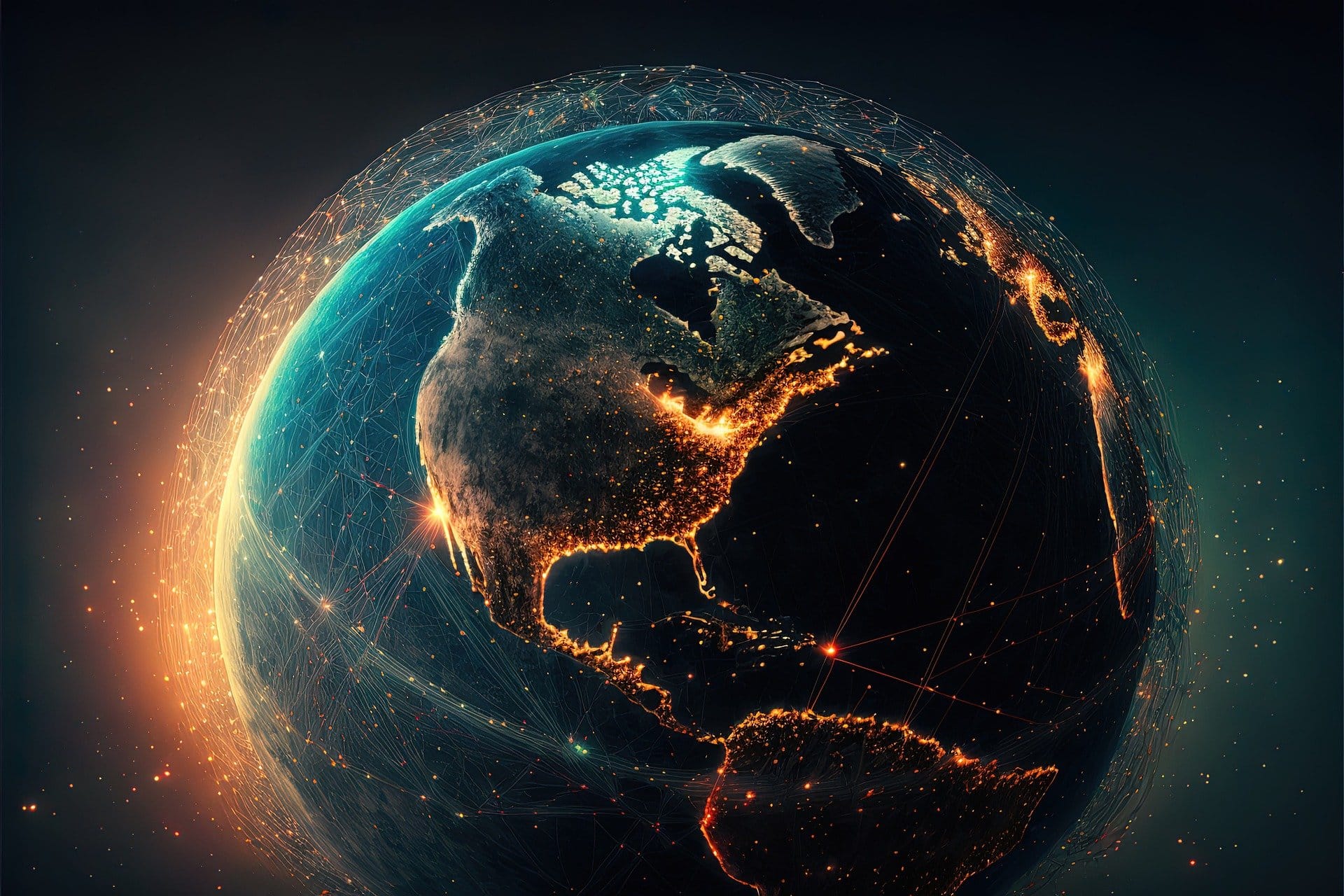
Important Insights from Related Books:
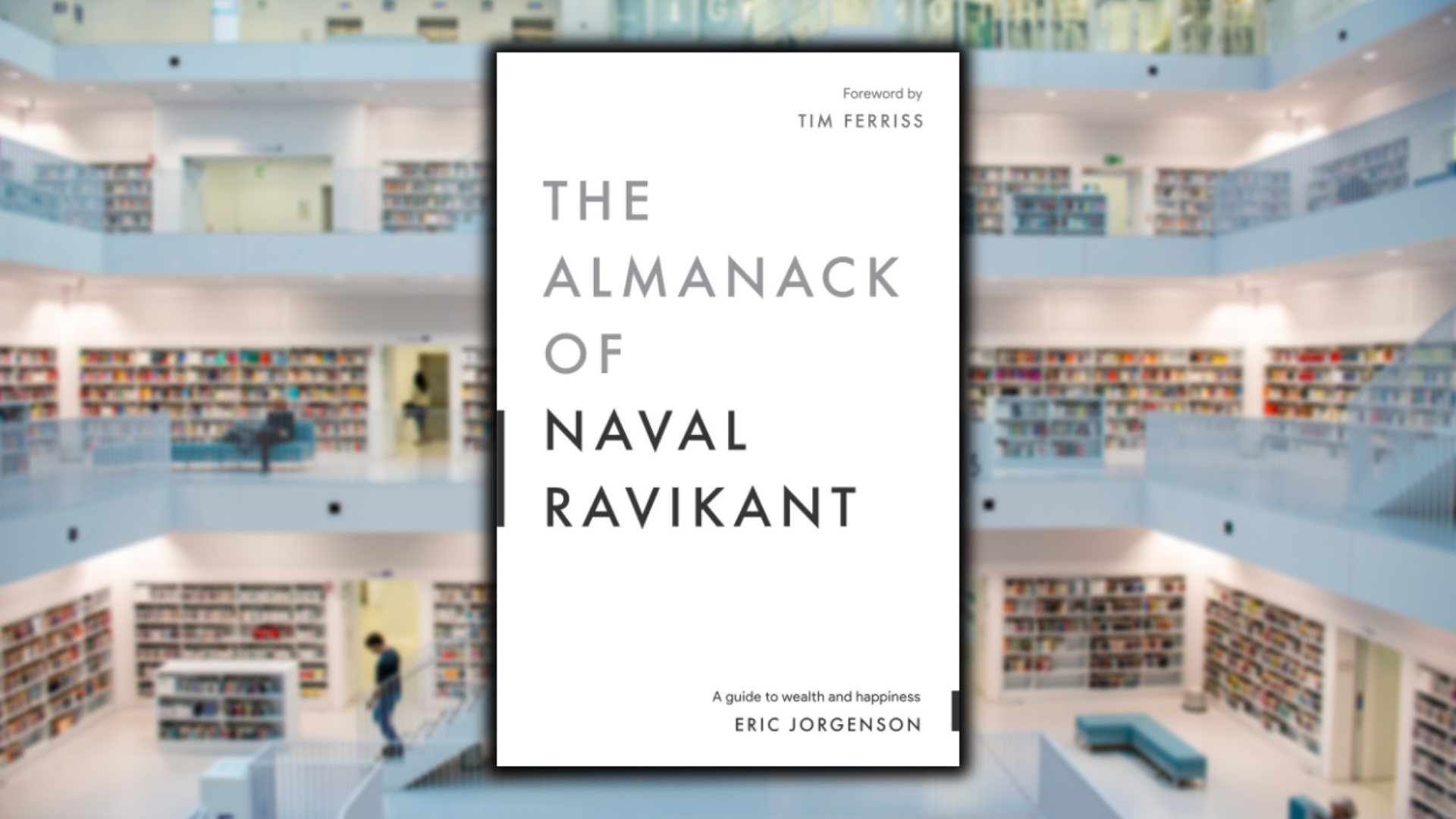
The Almanack of Naval Ravikant, by Eric Jorgenson:
Being rich and happy are learnable skills. As in certain propositions in physics, starting conditions are very important, but one of the greatest lessons you'll learn from reading books like this one is that where you start off doesn't have to be where you end up.
If there's a skill you lack, you can learn it; if there's a big scary problem looming over you, you can overcome it; if you want more out of life, you can have it.
But, there are traps along the way. These traps can take the form of pessimism and self-defeating behaviors; or the creeping expansion of desire; bad advice from well-meaning people; and a lot more that The Almanack of Naval Ravikant can help you avoid.
Naval is the founder of AngelList, a website that allows startups to raise money from angel investors free of charge, and he's had over 70 successful exits himself, after investing in companies like Uber and Twitter before almost anyone else.
He's become somewhat of an entrepreneurship/start-up culture icon, and this book is a collection of his greatest wisdom distilled from a decade of podcast appearances and thousands of tweets. After a lifetime of study and application of philosophy, economics, and wealth-creation, Naval has proven the impact of his principles, and they're all laid out here in this book.
Sample Quotes from the Book:
"Let's get you rich first. I'm very practical about it because, you know, Buddha was a prince. He started off really rich, then got to go off in the woods."
“Specific knowledge is knowledge you cannot be trained for. If society can train you, it can train someone else and replace you.”
“Learn to sell. Learn to build. If you can do both, you will be unstoppable.”
Read the Full Breakdown: The Almanack of Naval Ravikant, by Eric Jorgenson
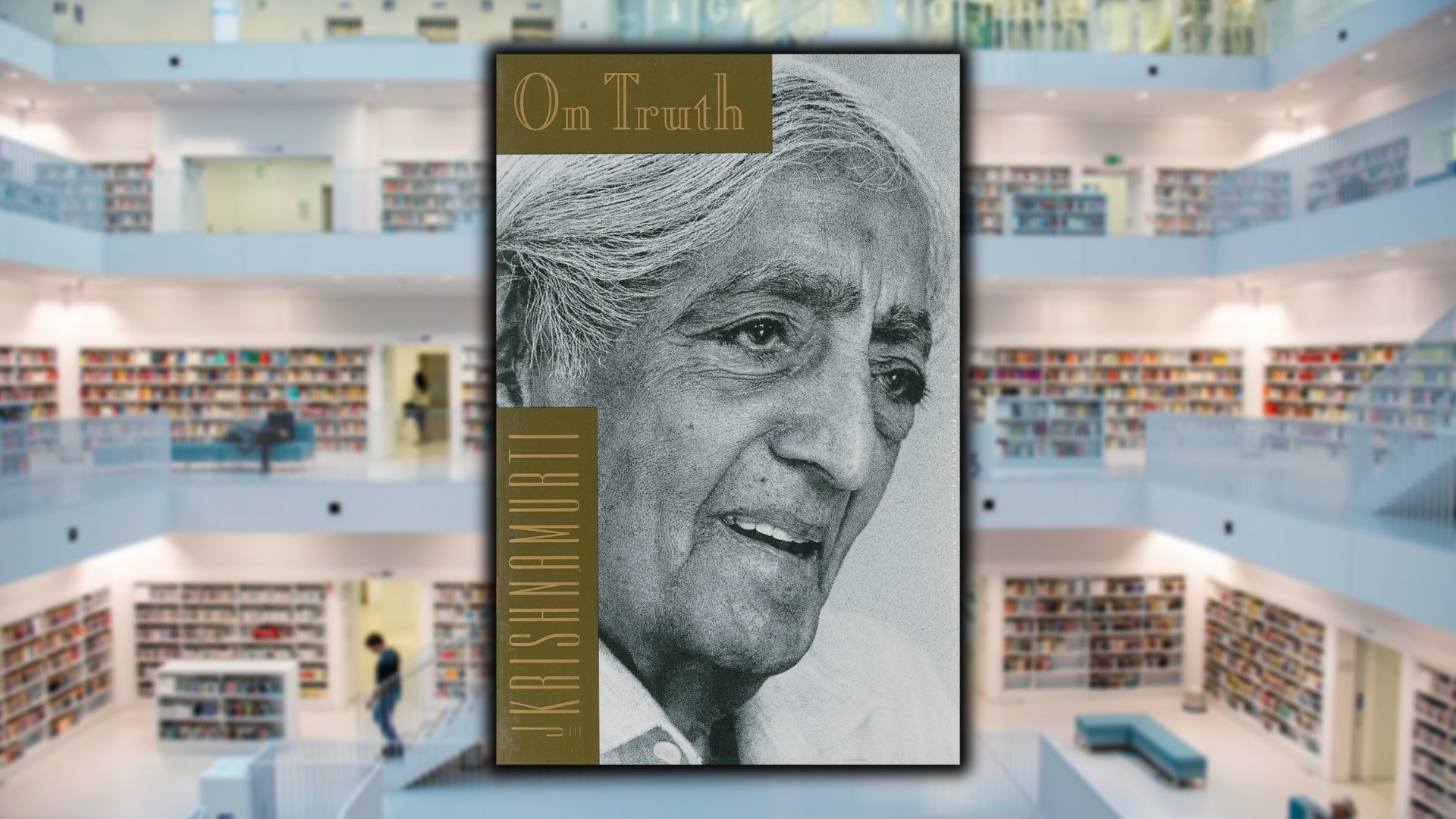
On Truth, by Jiddu Krishnamurti:
Thinking that you can find one Ultimate Truth that's going to be final and complete for all time is like a musician trying to hold down one note forever and ever; like trying to close your fist around a flickering flame; or like trying to stop a sunset and hold it in place until the end of time.
Trying to pin down the truth of human existence is an impossible task, and trying to fossilize that truth with words is always a mistake. Not only that, but no one can lead you to the truth either. Sure, they can suggest ways of approaching the truth, but they can never simply hand you the real thing.
Jiddu Krishnamurti understood this from a very early age when in 1929 he voluntarily dissolved the religious organization that sought to name him the new World Teacher and get him to take the lead of their new movement.
In a famous speech entitled Truth is a Pathless Land, he stated that it's impossible to follow anyone to truth and that you'll never find out the basic truth about the structure of Reality by listening to some leader or guru.
So naturally, Krishnamurti in this book - which is a collection of his public talks about the nature of truth and the various ways in which the mind distorts and obscures it - never claims to have access to some special truth that you or I don't have.
In my own life, Krishnamurti motivated me to question everything I thought I knew (and was told) about the world and the mystery of existence. He made me aware of the inner workings of my own mind and helped me see how truth arises when effort stops, when the mind is perfectly empty, and when there is only direct experience of the present moment.
All this is to say that this book won't teach you anything that's "true." Likewise, this breakdown can never claim to feature the Ultimate Truth about anything! There is no authority "out there" that can lead you to the truth, no "script" that you can follow that will lead you to the answers to the most important questions of life. But that's what makes being alive at all so damn exciting!
Dead, lifeless "truths" are just...boring. Life is always moving and changing, and so is the truth of Reality and Existence. The search for what's true is the wildest adventure in the whole damn universe, and we're all living it right now.
Sample Quotes from the Book:
“Truth is a thing that is living from moment to moment - to be discovered, not believed in, not quoted, not formulated. But to see that truth, your mind and your heart must be extremely pliable, alert."
“Truth is always new, and therefore timeless. What was truth yesterday is not truth today, what is truth today is not truth tomorrow. Truth has no continuity. It is the mind that wants to make the experience that it calls truth continuous, and such a mind will not know truth.
Truth is always new; it is to see the same smile, and see that smile newly, to see the same person, and see that person anew, to see the waving trees anew, to meet life anew.
Truth is not to be had through books, through devotion, or through self-immolation; it is known when the mind is free, quiet. And that freedom, that quietness of the mind, comes only when the facts of its relationships are understood. Without understanding its relationships, whatever the mind does only creates further problems.
But when the mind is free from all its projections, there is a state of quietness in which problems cease, and then only the timeless, the eternal comes into being.
Then truth is not a matter of knowledge, it is not a thing to be remembered, it is not something to be repeated, to be printed and spread abroad. Truth is that which is. It is nameless, and so the mind cannot approach it."
“I am talking to the individual because only the individual can change, not the mass; only you can transform yourself, and so the individual matters infinitely."
Read the Full Breakdown: On Truth, by Jiddu Krishnamurti
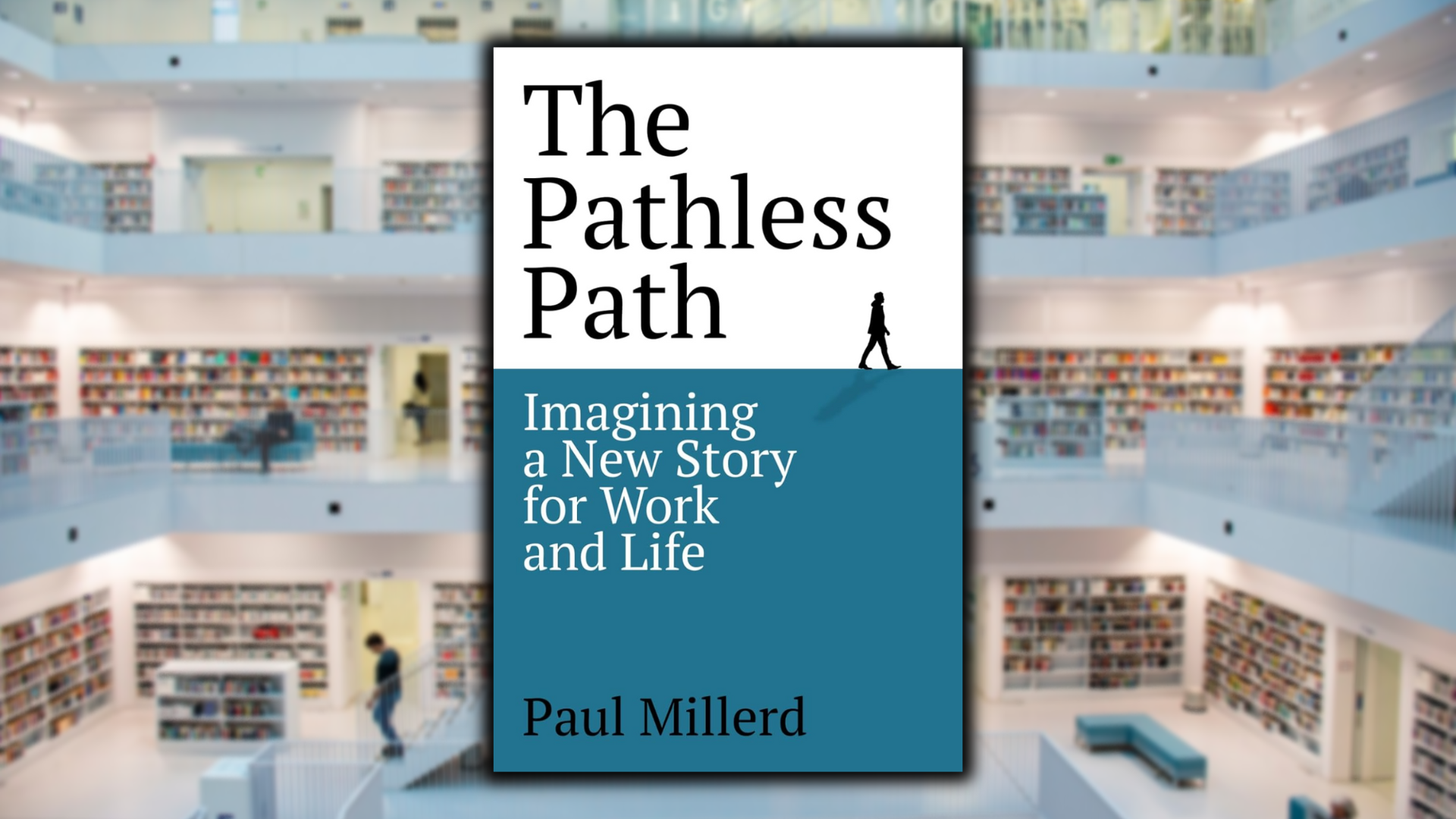
The Pathless Path, by Paul Millerd:
The chances of a perfect life path being successfully scripted for you by someone else are precisely zero. We exist in a community of others, but individually, we are completely alone and our lives are up to us.
More than that, we have the opportunity - the ability - to curate our own reality every moment, and by definition, no one can do this for us. We think that the meaning of life is "out there" and that we have to find out what it is. When in reality, it is Life that asks us the questions, and how we live is our answer.
In the same way, Paul Millerd doesn't have any answers. There are no hacks or step-by-step formulas in this book, no mandatory reading lists, and no milestones you have to hit in order to live a meaningful life.
Instead, The Pathless Path is about the invisible scripts that shepherd us into prescribed modes of living and being in the world; it's about freedom and creativity; it's about money, meaning, and work; and it's about being fearlessly, unapologetically yourself, in a world that shouts back, "You can't do that!"
It's also about going somewhere, but not following anything. Getting lost, and finding yourself. Leaving, but never arriving.
The book itself kind of meanders between Paul's personal story of leaving his high-profile career in search of work that matters, the history of work in our society, the meaning of money, entrepreneurship, alternative careers and lifestyles, and more. There's a Table of Contents, sure, but it doesn't tell you any more about the experience of reading the book than a map of Athens would tell you about ambling through the ruins of the Acropolis.
Mostly, though, it's about looking at the ladder you're climbing right now and asking yourself whether it's actually leaning against the right building. So if you've ever woken up in the wrong life (and who hasn't?), this is one of the books you may want to read next.
The default path - doing what everyone is doing, living the same day, week, month, and year that everyone else is living over and over again - used to work for most people. But this future that we're building together is not a default future. We have so many more options and opportunities - possibilities for our lives that we can explore and take to their logical conclusions. The default path is dying away, and we have to come to terms with our own freedom and what we want to do with it.
You might ask why, if the default path is so horrible, so many people choose to walk along it. The answer is that it's not so bad. It's actually pretty comfortable, it doesn't come with a whole lot of surprises, and you may even find moments of happiness - or something close to it - that allows you to shut out the awareness that there's so much more of you being left unexpressed.
I mean, here you are, the universe's most spectacular creation, and you're just kinda getting by. Living a "good enough" life, surviving day to day, coasting through a default world you never made.
The Pathless Path is Paul Millerd's answer to the question of what makes meaningful work and what we might aspire to in our lives. But you and I can never be Paul Millerd. His life is taken. You can only be yourself, and I can only be myself. The pathless path is narrow, wide enough for only one person. You.
Sample Quotes from the Book:
"I want to see people live the lives they are capable of, not just the ones they think they are allowed to live."
“The pathless path is an alternative to the default path. It is an embrace of uncertainty and discomfort. It's a call to adventure in a world that tells us to conform. For me, it's also a gentle reminder to laugh when things feel out of control and trust that an uncertain future is not a problem to be solved."
“As I’ve lived in different places around the world and focused on different kinds of work, I've created mini-experiments that help me learn more about how I want to live my life.
I try to think about time in blocks of one to three months and within each block, I pick one or two things I want to prioritize and test. It might be living in a different type of place, working on new projects, traveling, or learning something new.
My goal is to test my beliefs to get a better understanding of what really makes my life better. Many people say things to me like 'I could never live like you do!' All I can think, however, is 'Have you tested that?'"
Read the Full Breakdown: The Pathless Path, by Paul Millerd
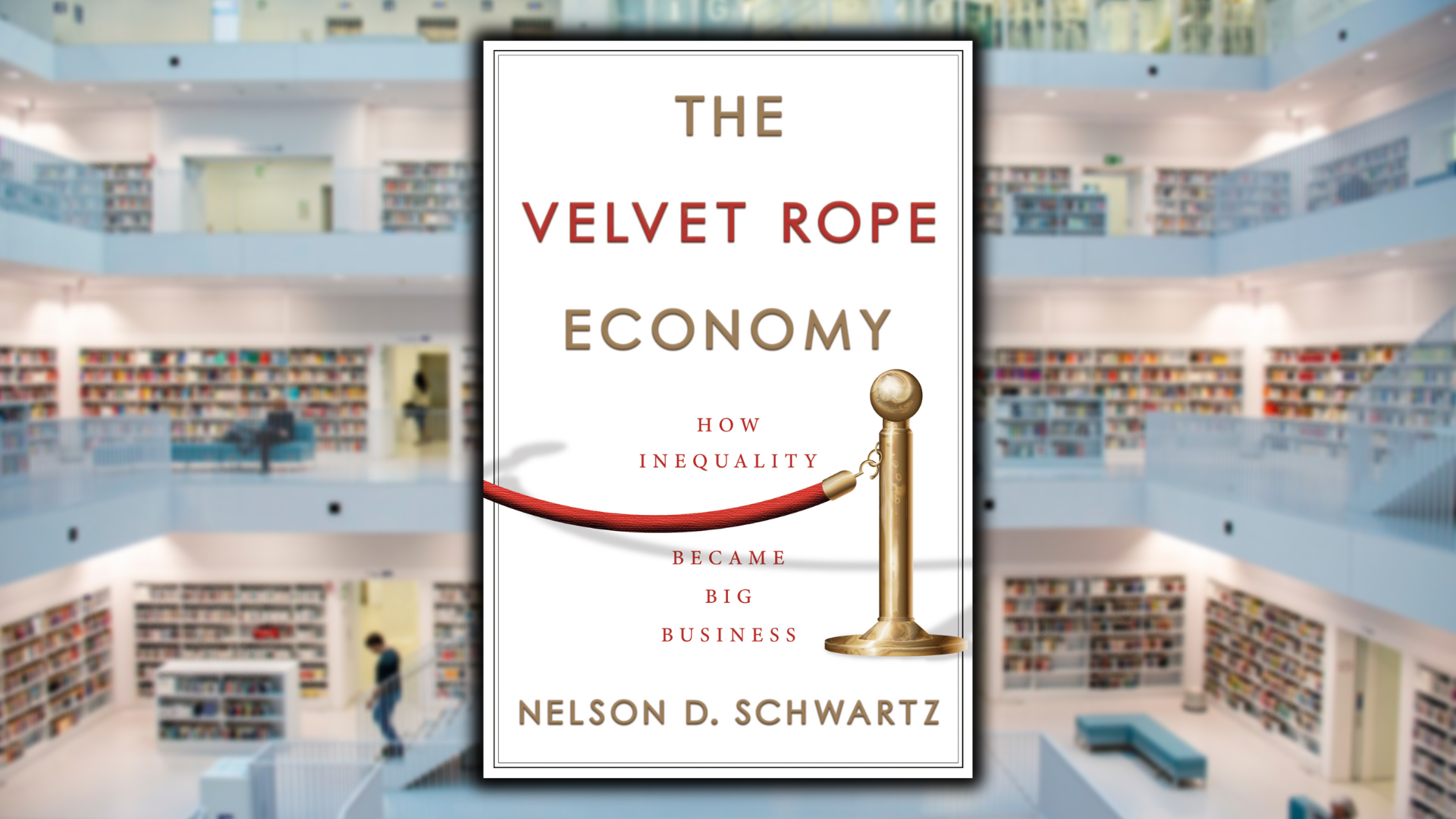
The Velvet Rope Economy, by Nelson D. Schwartz:
In the near future, society will be divided between the have-nots and the have-yachts. Between the people who have just enough, and the people who have more than they could ever need or spend.
Schwartz’s book is about the increasing split between the segment of consumers that are willing and able to pay for extra privileges and accommodations, and those who will have to take what they can get in this two-tier system.
He’s an economics reporter for The New York Times, and The Velvet Rope Economy is his sometimes intriguing, sometimes infuriating, but always illuminating investigation into the invisible rift that divides how poor Americans and rich Americans live.
The word "friction" also appears quite often in this book, and that's an important theme here as well. Life is senselessly difficult for those at the bottom, and there are roadblocks in every direction, barriers blocking them from getting ahead, rising above their debt, and building a real life for themselves.
I'm not "against" other people being able to afford access to an elevated existence, but I do see it as a problem that this "architecture" of inequality is more or less hidden.
In such a society, people on the "inside" lose all incentive to care about what happens to people on the "outside," and those on the outside resort to desperate, destructive means for a chance to participate in the dream. Inequality leads to resentment, resentment leads to violence, violence leads to chaos, and chaos ruins it for everybody.
While engaging with Schwartz's arguments, I didn’t feel as though I was being pressured to accept a political agenda, though; instead, it just felt like someone who cared deeply about the less fortunate was trying to get me to pay attention to something incredibly important and real.
Sample Quotes from the Book:
“Whatever the arena in contemporary life – health care, education, work, travel and leisure – on the right side of the rope is a friction-free existence where, for a price, needs are anticipated and catered to. Red tape is cut, lines are jumped, appointments are secured, and doors are opened.
On the other side of the Velvet Rope, friction is practically the defining characteristic, with middle- and working-class Americans facing an increasingly Darwinian fight for a decent seat on the plane, a place in line with their kids at the amusement park, a college scholarship, or a doctor’s appointment.”
“Separation is now taking place within public institutions as well, subverting the values that made them public in the first place.”
“Capitalism exists with the consent of democracy, and the more the vast majority find themselves not just outside the Velvet Rope but treated with disdain, the system itself is threatened.
It’s up to all of us – including those well-ensconced inside the Velvet Rope – to create a less segmented society, where Americans from different walks of life actually meet one another and find common ground. If they do, maybe there will be more talking, and less shouting, in public life.
It won’t be easy. There are huge profits to be made in the Velvet Rope Economy, and the temptation there is always to raise the cordons even higher. That’s the way things are going. But it doesn’t have to be that way.
There’s room enough for all of us inside the Velvet Rope.”
Read the Full Breakdown: The Velvet Rope Economy, by Nelson D. Schwartz

Questions to Stimulate Your Thinking:
The quality of your questions determines the quality of your life. That's also how you get the absolute most out of any book that you decide to read:
You ask great questions the whole time - as though the book was on trial for its life.
Here in this section are a few questions that can help guide and stimulate your thinking, but try to come up with your own additional questions, especially if you decide to read this book the whole way through...
#1: "What could we be wrong about tomorrow that everybody agrees on and is completely convinced we're right about today?"
#2: "Do you believe that there's enough wealth to go around (or that there could be in the future), or that the supply of wealth is forever fixed?"
#3: "Would you agree to being under constant surveillance at all times and in all places if you could be guaranteed that all violent crime could be eliminated?"
#4: "What technology do you never want to see invented?"
#5: "What's the most dangerous technology being developed today? Is there at least one possible, positive use-case for it?"
#6: "Are you prepared for the future? Or as prepared as you could be? What changes would you have to make and/or adopt to help you adapt successfully to the future?"
#7: "Do you want to live forever? If it were possible to live indefinitely (assuming you remain in good health and retain all your cognitive faculties), would that be desirable?"
#8: "How long do you believe the human species will exist for?"
#9: "What are the chances that humanity destroys itself before we become an interplanetary (perhaps even intergalactic) species? Is it inevitable?"
#10: "What do you think is the biggest obstacle to progress?"
"Judge a man by his questions, rather than by his answers."
-Voltaire
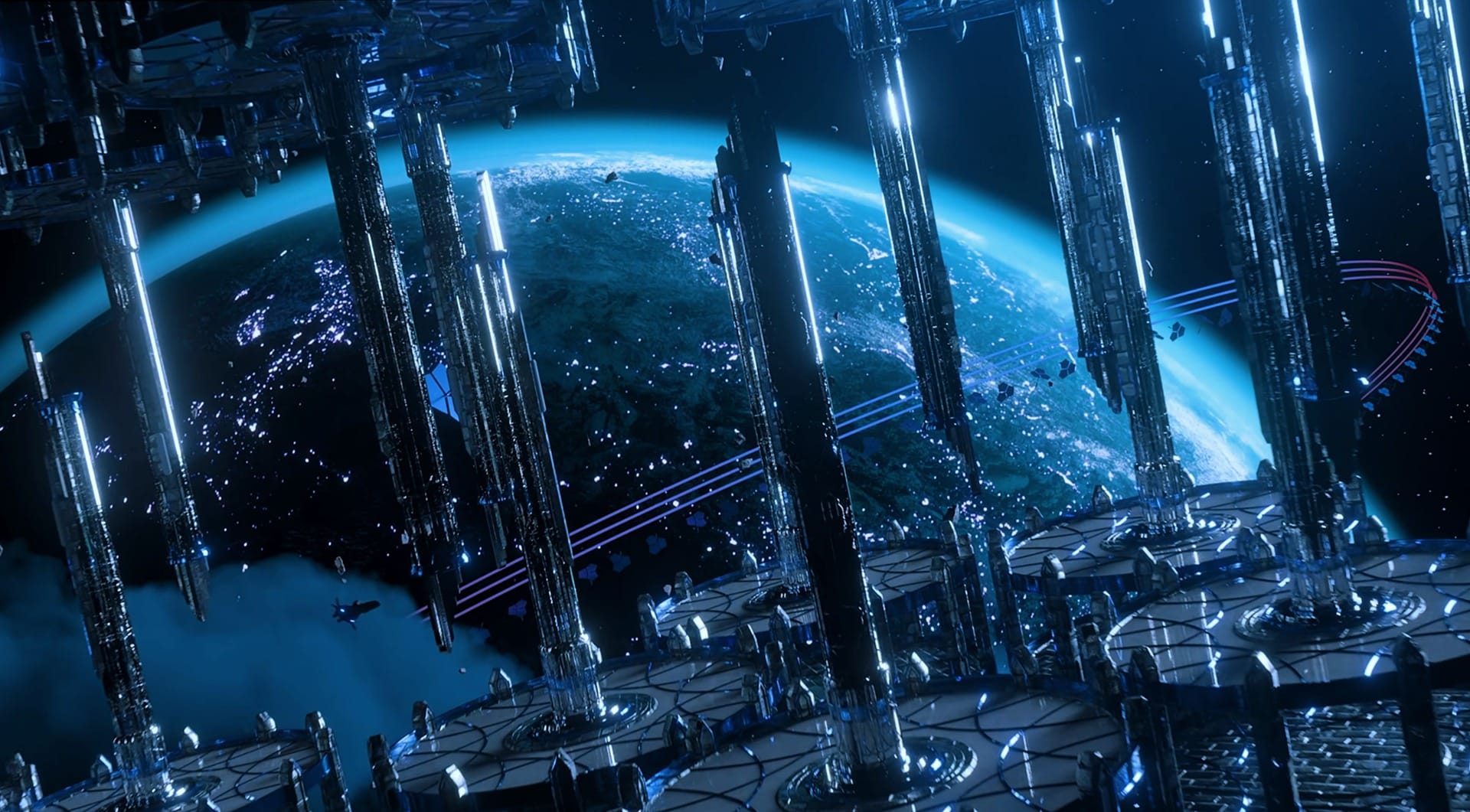
Action Steps:
So you've finished reading. What do you do now?
Reading for pleasure is great, and I wholeheartedly support it. However, I am intensely practical when I'm reading for a particular purpose. I want a result. I want to take what I've learned and apply it to my one and only life to make it better!
Because that's really what the Great Books all say. They all say: "You must change your life!" So here, below, are some suggestions for how you can apply the wisdom found in this breakdown to improve your actual life.
Please commit to taking massive action on this immediately! Acting on what you've learned here today will also help you solidify it in your long-term memory. So there's a double benefit! Let's begin...
#1: Learn to Code
You're very unlikely to regret learning how to code. It's useful damn-near everywhere, it's in high demand, people who possess the ability are paid well, and this is likely to continue. It's one of the surest bets when it comes to skills that are still going to be relevant for years and years.
It's also highly satisfying when you run a test on the code you've just developed and find that it works. No matter how simple the command or function, it's cool seeing what was once a foreign language to you turn into an external reality. Thinking in code is an entirely new way of perceiving, and even the process of learning it is worthwhile.
The future is going to be built on code - it is being built on code - and if you want to help build it, speaking the same universal language as the other builders is only going to help you. I like to give myself at least "two ways to win and no way to lose," and learning to code is an excellent example of this.
#2: Question Everything
Balaji wants you to question underlying assumptions about how things are currently done. Krishnamurti, in much the same way, wanted people to think for themselves and never delegate their thinking to a leader or other external authority.
I may not have an "i" at the end of my name, but you can put me in that crowd too: I don't want you to follow me, or believe me just because I said something or wrote something you agreed with. I want you to go and find out for yourself.
Alex Hormozi said that we can question all our beliefs except those we truly believe, because those are the ones we never think to question. Going deeper, asking yourself why you believe what you believe, and whether you can even explain your beliefs is what you must do. As they say, if you can't explain why you believe what you believe, then they're probably not really your beliefs. They're someone else's.
No one - and I mean absolutely no one - can tell you what to think, based on their authority alone. "Because I said so" is not a valid reason. Beliefs are the product of a dead mind, a mind that has ceased to question. The future is a process, always becoming, always "not yet," and once your mind has settled on a belief, that's the moment that it has become to die.
#3: Invest in the World You Want to See Built
Everyone changes the world every single day. Some people change the world more than others, of course, but it's not a competition. You don't have to invent anything that saves a billion lives (although if that's your ambitious, I say fucking go for it). You can just start wherever you are. Pick something you want to change, keep coming up with potential solutions, and keep running experiments.
If you can't find anything to change, what you're really saying is that the world is perfect and needs nothing. You and I both know that's not true. Again, it all comes back to running experiments. You don't know what you want to change, because you've never tried to change anything.
If it helps, you can draw your mind back to the fact that there is an abundance of problems and opportunities everywhere - potential directions that humanity could head - and you can play a part in directing the future. Humanity can feed everyone, and you can be a part of that. Humanity can clothe everyone, and you can be a part of that. Humanity can expand into interstellar space and explore the fucking galaxy - and you can be a part of that. Why not you? Why not now?
"The path to success is to take massive, determined action."
-Tony Robbins

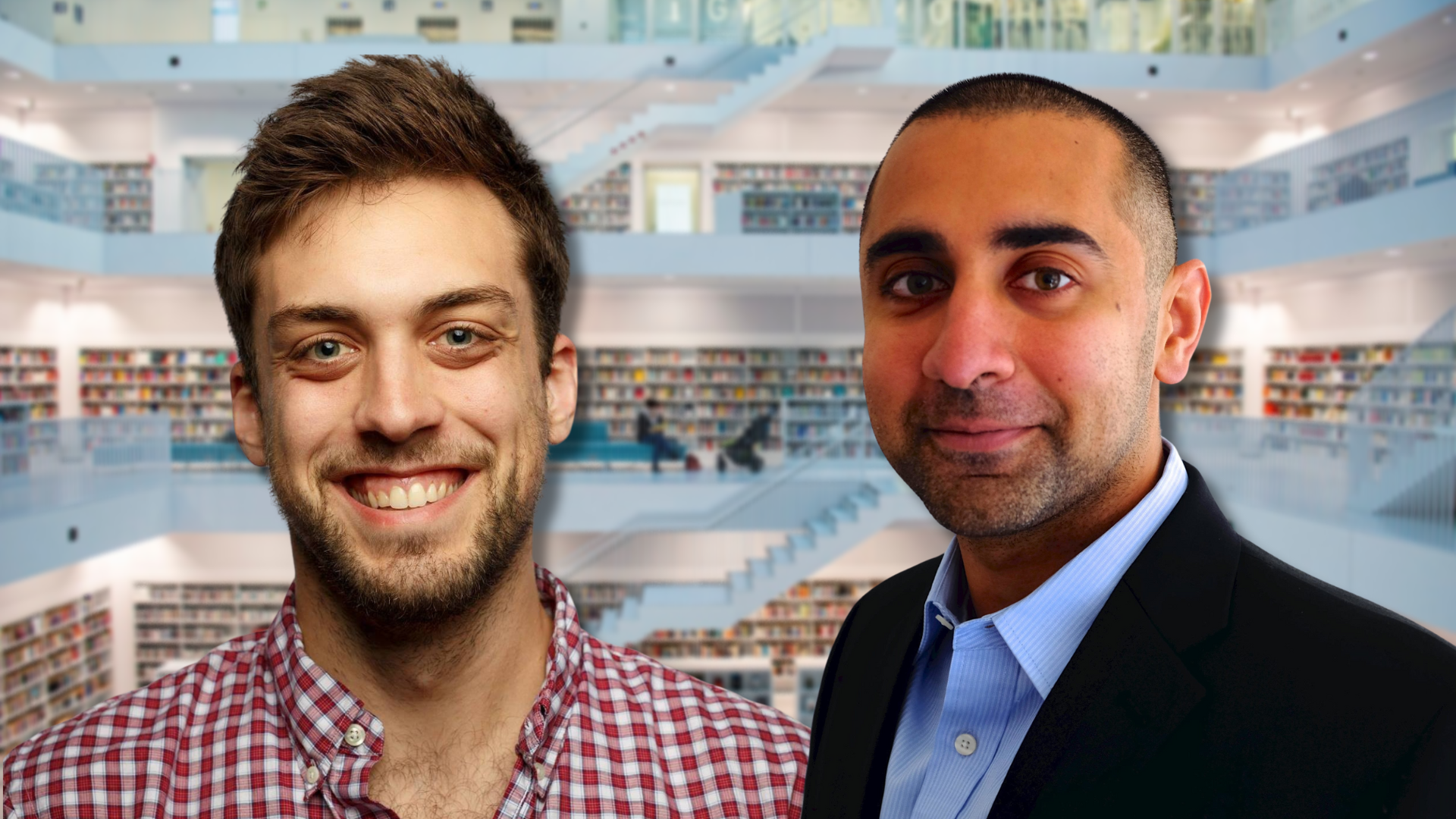
About the Authors:
Eric Jorgenson (left) writes about technology and startups and invests in early-stage technology companies. He's also CEO of Scribe Media, and his blog has educated and entertained more than one million readers since 2014. Eric is the author of The Almanack of Naval Ravikant (over 1 million sold) and he also hosts the podcast Smart Friends.
Balaji S. Srinivasan (right) is a serial entrepreneur who has also invested in Benchling, Digital Ocean, Ethereum, OpenSea, Superhuman, and hundreds more. He was co-founder of Counsyl, CTO of Coinbase, and general partner at Andreessen Horowitz. Balaji received BS, MS, and PhD degrees in electrical engineering and an MS in chemical engineering from Stanford, and is also the author of The Network State.
Additional Resources:
Read The Anthology of Balaji for Free | Eric Jorgenson
Read The Almanack of Naval Ravikant for Free | Eric Jorgenson
Balaji - This Country Will Win the Future | YouTube
This Book on Amazon:
The Anthology of Balaji, by Eric Jorgenson
If You Liked This Book:
The Network State, by Balaji Srinivasan
The Almanack of Naval Ravikant, by Eric Jorgenson
The Sovereign Individual, by James Dale Davidson and Lord William Rees-Mogg
The Bitcoin Standard, by Saifedean Ammous
Read Write Own, by Chris Dixon
Finite and Infinite Games, by James P. Carse
The Bed of Procrustes, by Nassim Taleb
Enlightenment Now, by Steven Pinker
The Pathless Path, by Paul Millerd
On Truth, by Jiddu Krishnamurti

